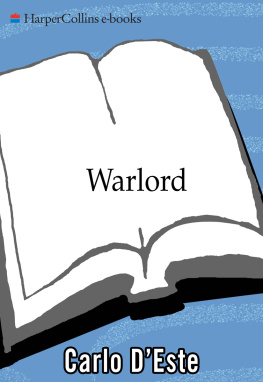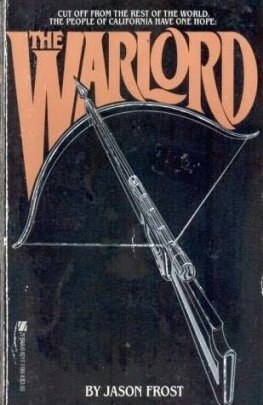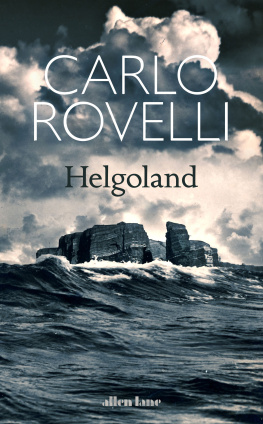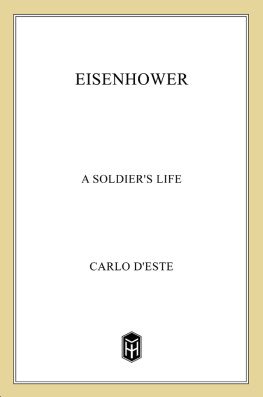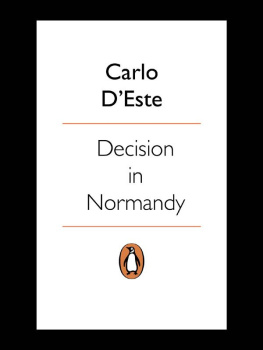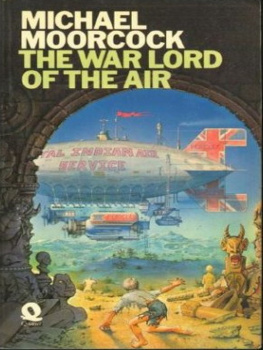Carlo DEste - Warlord
Here you can read online Carlo DEste - Warlord full text of the book (entire story) in english for free. Download pdf and epub, get meaning, cover and reviews about this ebook. year: 2008, publisher: HarperCollins, genre: Non-fiction. Description of the work, (preface) as well as reviews are available. Best literature library LitArk.com created for fans of good reading and offers a wide selection of genres:
Romance novel
Science fiction
Adventure
Detective
Science
History
Home and family
Prose
Art
Politics
Computer
Non-fiction
Religion
Business
Children
Humor
Choose a favorite category and find really read worthwhile books. Enjoy immersion in the world of imagination, feel the emotions of the characters or learn something new for yourself, make an fascinating discovery.
- Book:Warlord
- Author:
- Publisher:HarperCollins
- Genre:
- Year:2008
- Rating:4 / 5
- Favourites:Add to favourites
- Your mark:
- 80
- 1
- 2
- 3
- 4
- 5
Warlord: summary, description and annotation
We offer to read an annotation, description, summary or preface (depends on what the author of the book "Warlord" wrote himself). If you haven't found the necessary information about the book — write in the comments, we will try to find it.
Warlord — read online for free the complete book (whole text) full work
Below is the text of the book, divided by pages. System saving the place of the last page read, allows you to conveniently read the book "Warlord" online for free, without having to search again every time where you left off. Put a bookmark, and you can go to the page where you finished reading at any time.
Font size:
Interval:
Bookmark:
A Life of Winston Churchill at War, 18741945

For Sue and Harry Brack,
esteemed friends who helped to make this book possible; and
for my wife, Shirley Ann.
In memory of Airman Shirley Barton Eldridge, one of the many
thousands who gave their lives in the cause of World War II.
A BRIEF WORD ABOUT WHAT this book isand is not. It is the very human story of Winston Churchills military life and of a young mans quest for military adventure, which, combined with his ambitious, up-and-down political career, carried him to the leadership of Great Britain in 1940and the historic years as generalissimo that followed.
What Churchill wrote of his youth summed up his entire life. From the time he graduated from Sandhurst in 1894 into a world that opened to him like Aladdins cave, he never had time to turn round. His life became like an endless moving picture in which one was an actor. On the whole Great Fun! What Churchill neglected to mention was that in the moving picture of his life he was not merely an actor but the star.
Warlord is less about events and more about Churchill the man: his leadership, his triumphs, and his failures. While there isof necessitya certain level of selectivity, on balance the reader will find it a faithful account of an extraordinary military life that encompassed most of the seminal events of the twentieth century, culminating in the greatest, most devastating war in the history of planet Earth.
BORN FOR WAR
The largest human being of our time.
SIR ISAIAH BERLIN
L ONG BEFORE HE BECAME a statesman, Winston Churchill was first a soldier. War and soldiering were in his blood: from his first fantasies as a youth to their practice as a young man and, later, their direction as Britains wartime leader.
His fascination with soldiering began in the nursery, with his army of toy soldiers that he used to wage fantasy battles. His early experiences as a young cavalry officer and war correspondent took him to distant and exotic places and exposed him to war in its many aspects, including all of its gruesome horrors. Even as prime minister and one of the worlds most powerful men during World War II, Churchill never lost his love of soldiering, often lamenting that he had missed his calling by not winning fame as a battlefield warrior.
Churchill was one of the rare figures in history, men such as Frederick the Great, Oliver Cromwell, and his own famous ancestor, the Duke of Marlborough, who were born for war, as Napoleon once described himself. These were war leaders who instinctively understood it in all of its aspects: strategic, political, diplomatic, moral and psychological. Moreover, as one of Churchills most astute biographers, Sebastian Haffner, has observed: No one will ever understand the phenomenon that was Churchill by regarding him simply as a politician and statesman who was ultimately destined like Asquith or Lloyd George, Wilson or Roosevelt, to conduct a war; he was a warrior who realized that politics forms a part of the conduct of war.
Less well known is that Churchill was a military visionary with ideas of astonishing originality. As First Lord of the Admiralty in 1915, he conceived and approved the design and construction of an enormous Trojan horselike armored vehicle that would transport in safety between eighty and one hundred troops across no-mans-land to assault the German trenches; and in 1939, again as First Lord, he conceived Nellie, a gargantuan trench digger that would be utilized to permit the infantry to overwhelm the powerful defenses of the Siegfried Line in safety. Although both projects ultimately failed, they were nevertheless examples of the remarkably innovative ideas that poured forth from Churchills fertile mind.
In 1912, well before others could see the warning signs, Churchill foretold a potential great conflict. In a prophetic letter to his cousin and close friend Charles Sunny Churchill, the ninth Duke of Marlborough, he warned of the threat of war emanating from the unstable situation in the Balkans, and noted: The European situation is far from safe and anything might happen. It only needs a little ill will or bad faith on the part of a great power to precipitate a far greater conflict.
Despite having personal experience of war at Omdurman in 1898, and as a participant in the last cavalry charge in the history of the British army, Churchill nevertheless held a Victorians somewhat romanticized view of war, and of Britains greatness of empire as the most powerful nation on earth. One perceptive observer, Cecil H. King, has described Churchill as a man of the 19th, if not the 18th century; he knows little and cares less for the political currents of the day. To him war is a vast pageant with himself in a scarlet uniform on a white horse, baton in hand, leading the British forces forward through the smoke of battle.
As a twenty-two-year-old junior officer fresh from Sandhurst, Churchill was torn between his youthful enthusiasm for putting his life on the line and the horror of the wars he fought in. His military experience as a soldier exposed him to the grit, blood, and death of war in its cruelest forms. His exploits left Churchill with an abhorrence of war, and during the first three decades of the twentieth century his was a frequent, often strident, but forlorn voice preaching preparedness and other means of avoiding war. However, when war engulfed the world for the second time in twenty-five years, Churchill answered the call. Where others talked of peace with Nazi Germany, Churchills was the strongest voice of refusal to let tyranny become the new sovereign of Britain.
Although he became perhaps the most famous politician in British history, Churchill never strayed far from his military roots. While political office and its myriad powers were his ultimate goal, Churchill used soldiering, writing, and his experience as a war correspondent toward that end. Politics may have dominated his life, but soldiering was a passion he never lost during his political rise. During World War II, Churchill was frequently seen in the uniform of the Royal Air Force or in that of an army colonel. As one writer has noted, Wellington was a soldier who felt it his duty to be a politician. Churchill was a politician who wanted to be a soldier. A nation which since Cromwell has always felt uncomfortable with all but its most eccentric military leaders, was led in its most dangerous battle by a war leader in a zip-suit and carpet slippers.
Churchill possessed an unfulfilled lifelong ambition to become a warrior-hero in the Napoleonic mold, which even service in the squalor of the front lines as a lieutenant colonel commanding a rifle battalion in France in 1916 failed to cure. Later in his life Churchill called war the greatest of all stimulants. As early as 1911, one of his critics noted with insightful accuracy, He is always unconsciously playing a partan heroic part. And he is himself his most astonished spectator. He sees himself moving through the smoke of battletriumphant, terrible, his brow clothed with thunder, his legions looking to him for victory, and not looking in vain. He thinks of Napoleon; he thinks of his great ancestor [the Duke of Marlborough][in his] fervid and picturesque imagination there are always great deeds afoot, with himself cast by destiny in the Agamemnon role.
Warts and all, Winston Churchill nevertheless represented the indomitable spirit and symbol of a defiant nation under siege. His oratory was stirring and, like FDRs, Churchills words galvanized an entire nation. His predecessor as prime minister, Neville Chamberlain, regarded Hitler as the commonest little dog, but was duped and coerced by the German dictators signature on the meaningless Munich agreement in September 1938, a vaguely worded covenant that lacked even the ringing affirmation of nonaggression treaties. Chamberlains well-intentioned declaration of peace in our time was actually a death warrant for France and a guarantee that Britain was destined for another war with Germany. When he learned of Munich, Churchill remarked: This is only the first step, the first foretaste of a bitter cup which will be proffered to us year by year unless by a supreme recovery of moral health and martial vigor we arise again and take our stand for freedom. When the foreign secretary, Lord Halifax, suggested that Britain make peace with Hitler, Churchill not only declined but instead vowed to rescue mankind from the foulest and most soul-destroying tyranny which has ever darkened the stained pages of history.
Font size:
Interval:
Bookmark:
Similar books «Warlord»
Look at similar books to Warlord. We have selected literature similar in name and meaning in the hope of providing readers with more options to find new, interesting, not yet read works.
Discussion, reviews of the book Warlord and just readers' own opinions. Leave your comments, write what you think about the work, its meaning or the main characters. Specify what exactly you liked and what you didn't like, and why you think so.

